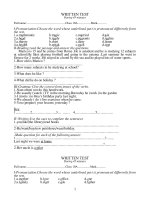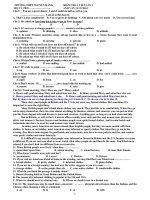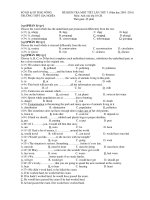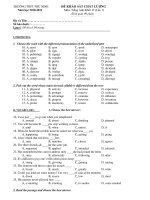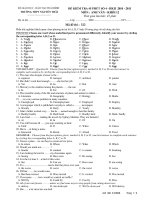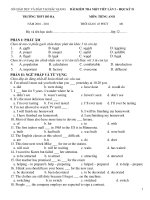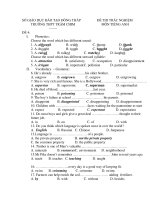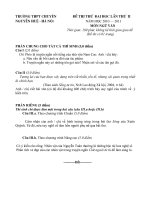KIỂM TRA 1 TIẾT LẦN 1 - TRƯỜNG THPT NGUYỄN ĐÁNG pot
Bạn đang xem bản rút gọn của tài liệu. Xem và tải ngay bản đầy đủ của tài liệu tại đây (69.58 KB, 2 trang )
TRƯỜNG THPT NGUYỄN ĐÁNG KIỂM TRA 1 TIẾT LẦN 1
HỌ VÀ TÊN:……………………. ANH VĂN 12 CƠ BẢN
Câu 1: _ You are a great dancer. I wish I could do half as well as you.
_ ……………………… I am an awful dancer.
A. That’s a nice compliment! B. You’ve got to be kidding! C. Oh, thank you very much D. You are too kind.
Câu 2: He asked me how long did it take to get to Paris by train?
A B C D
Câu 3: It’s not easy to change people’s …………toward a certain problem.
A. opinion B. thinking C. idea D. attitude
Câu 4: In some Western countries, many old-age parents like to live in a … house because they want to lead
independent lives.
A. printing B. nursing C. private D. guest
Câu 5: “What will you do if you have ten days off school?” he asked
A. He asked what I would do if I had ten days off school.
B. He asked what would I do if I had ten days off school.
C. He asked what I will do if I have ten days off school.
D. He asked me what will I do if I have ten days off school.
Câu 6: Michael took a photograph of Sandra while she …………………
A. smiled. B. was smiling. C. has smiled. D. had smiled.
Câu 7: It’s rude to point……………… someone.
A. up B. on C. out D. at
Câu 8: Many workers in Bien Hoa industrial park have to work so hard that they can’t come home …… very
late at night
A. until B. from C. on D. for
Câu 9: Don’t worry. I’ll…………………you a hand with the washing up.
A. return B. borrow C. take D. give
Câu 10: “Good morning, Mary! How are you?” Henry asked
A. Henry said good morning Mary and asked how was she. B. Henry greeted Mary and asked how she was.
C. Henry greeted Mary and asked how is she. D. Henry said good morning and asked Mary how she is.
Đọc kỹ đoạn văn sau và chọn phương án đúng (ứng với A hoặc B, C, D) cho các câu từ 11 đến 15.
These days, most people in Britain and the U S do not wear very formal clothes. But sometimes it is
important to wear the right thing.
Many British people don’t think about clothes very much. They just like to be comfortable. When they go
out to enjoy themselves, they can wear almost anything. At theatres, cinema, and concerts you can put on what
you like from elegant suits and dresses to jeans and sweaters. Anything goes, as long as you look clean and tidy.
But in Britain, as well as the U S men in offices usually wear suits and ties, and women wear dresses or
skirts (not trousers). Doctors, lawyers and business people wear quite formal clothes. And in some hotels and
restaurants men have to wear ties and women wear smart dresses.
In many years, American are more relaxed than English people, but they are more careful with their
clothes. At home, or on holiday, most American wear informal or sporty clothes. But when they go out in the
evening, they like to look elegant. In good hotels and restaurants, men have to wear jackets and ties, and women
wear pretty clothes and smart hairstyle.
It is difficult to say exactly what people wear informal or formal in Britain and the U S, because everyone
is different. If you are not sure what to wear, watch what other people do and then do the same. You’ll feel more
relaxed if you don’t look too different from everyone else.
11. Many British people wear freely when they………………
A. spend their spare time. B. attend meeting C. attend lectures D. meet their friends
12. Who doesn’t usually wear suits and ties?
A. Accountants B. Layers C. Doctors D. Drivers
13. If you visit an American friend at home in the evening, you may find that your friend wear……………….
A. formal clothes B. pretty clothes C. informal clothes D. plain clothes
14. If you are in a foreign country, the best way the writer suggests to you is to wear………
A. strange clothes B. as the people there do C. your native clothes D. comfortable clothes
15. What do you think the passage is mainly about?
A. Recent dressing habit in Great Britain and the United States.
B. The reason why informal clothing is popular in the UK and USA.
C. When we should wear in a formal way. D. Where we should wear in a formal way.
Câu 16: The Americans may be much more concerned … ……. physical attractiveness than the Indians and the
Chinese when choosing a wife or a husband
A. on B. in C. of D. with
1
Câu 17: Non-verbal……………….such as waving, nodding or shaking of the head also have cultural meanings.
A. signals B. hints C. signs D. marks
Câu 18: He is always…………… of his father’s wishes.
A. confident B. expressive C. supportive D. obedient
Câu 19: We wrote the report in half an hour.
A. It took us half an hour write the report B. It takes us half an hour we write the report
C. It took us half an hour to write the report D. It took us half an hour writing the report
Câu 20: _ I am not sure about this soup. It takes like something’s missing.
_ ………………………… .It tastes fine to me.
A. I don’t think so B. Oh, I don’t know. C. You are right. D. I couldn’t agree more
Câu 21: They are whispering to avoid………………by their friends.
A. being heard B. being hearing C. hearing D. to be heard
Câu 22: _ .
_Oh, thank you. I just got it yesterday.
A. When have you got this beautiful dress? B. You’ve just bought this beautiful dress, haven’t you?
C. What a beautiful dress you have on! D. How a beautiful dress you are wearing!
Câu 23: A. derived B. cleaned C. cancelled D. guessed
Đọc kỹ đoạn văn sau và chọn phương án đúng (ứng với A hoặc B, C, D) từ câu 24 đến 28
What is culture? Culture means the way of living of a particular group of people. People from different
cultures (24)………………up with their customs, beliefs and values. For example, if you travel from one country
to another, you will probably(25)……………the people do some things very differently to the ways you
are(26)………………with in your culture. Culture is usually passed from parents to children for many
generations, so people sometimes (27)………… that their culture is the only correct way to live.
Do you think everyone in the world should do things as you do them in your culture or
(28)…………… you opened-minded about their customs? Many people believe that learning about cultures can
be educational and rewarding.
Câu 24. A. grow B. come C. bring D. fed
Câu 25. A. meet B. think C. find D. feel
Câu 26. A. concerned B. popular C. bored D. familiar
Câu 27. A. say B. know C. believe D. study
Câu 28. A. are B. do C. will D. have
Câu 29: She…………….this cool pair of blue sunglasses.
A. had just bought B. is just buying C. has just bought D. is just going to buy
Câu 30: A. leaves B. brings C. coughs D. days
Câu 31: _ Congratulation! You did great.
_
A. It’s my pleasure. B. That’s OK. C. You are welcome. D. It’s nice of you to say so.
Câu 32: “Please don’t leave until I come back” Sarah said
A. Sarah said to us to not leave until she comes back. B. Sarah told us do not leave until she comes back.
C. Sarah asked us not to leave until she came back. D. Sarah asked us not leave until she came back.
Câu 33: Mike told that he was leaving the next day, not then.
A B C D
Câu 34: It’s the first time I saw this film
A B C D
Câu 35: Why don’t you make it bigger and more beautiful in order to ……………………people’s attention?
A. keep B. attract C. hold D. raise
Câu 36: Gold, as well as silver,……………in price.
A. rise B. have risen C. has risen D. are rising
Câu 37: The cake was too hot for him to eat.
A. The cake was so hot that he couldn’t eat it B. The cake was so hot that for him to eat.
C. The cake was so hot that he can’t eat it D. It was such so hot cake that he couldn’t eat.
Câu 38: If the flood……………… last month, the farmers……………… a good crop now.
A. doesn’t happen/will have B. hadn’t happened/would have had
C. didn’t happen/ would have D. hadn’t happened/would have
Câu 39: He asked if I can make an appointment.
A B C D
Câu 40:
A. wanted B. conducted C. provided D. lived
2
